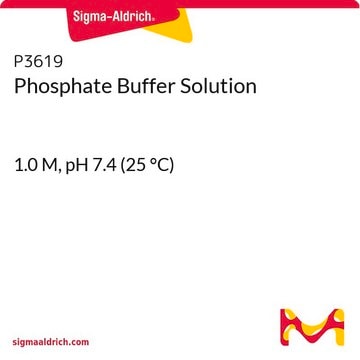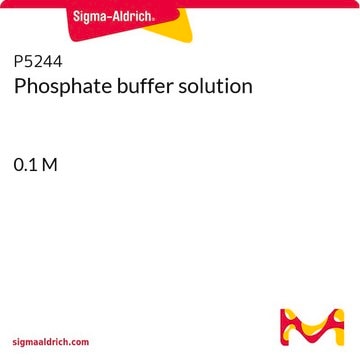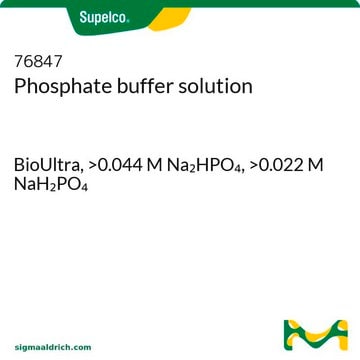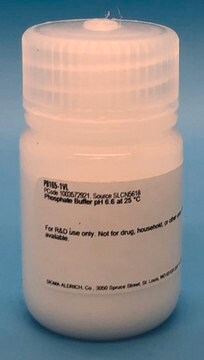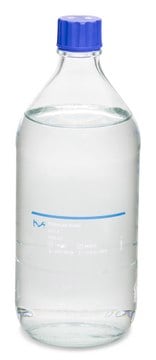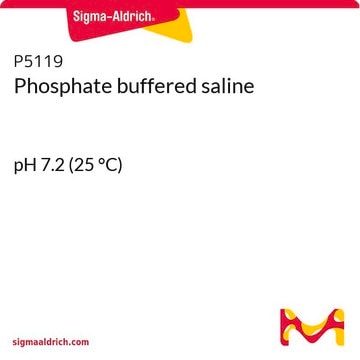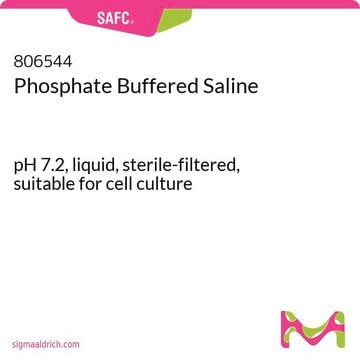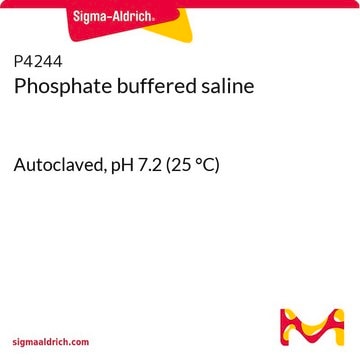17202
Phosphate buffer
suitable for microbiology, APHA, pH 7.2, NutriSelect® Plus
Sign Into View Organizational & Contract Pricing
All Photos(1)
About This Item
UNSPSC Code:
41171610
NACRES:
NA.85
Recommended Products
Agency
according to GB 4789.10-2016
according to GB 4789.15-2016
Quality Level
sterility
non-sterile
form
powder
composition
monopotassium phosphate, 26.22 g/L
sodium carbonate, 7.78 g/L
manufacturer/tradename
NutriSelect® Plus
final pH
7.2±0.2 (25 °C)
application(s)
agriculture
environmental
food and beverages
sample preparation
veterinary
water monitoring
microbiology
Application
For the preparation of dilutions, blanks for the examination of waters, dairy products, foods, eating utensils and other specimens.
Preparation Note
Dissolve 34 g in 1 litre distilled water. Dispense and sterilize by autoclaving at 121°C for 15 minutes. The pH, after autoclaving and cooling to room temperature should be 7.2 ± 0.2.
Footnote
We offer two media types: the superior granulated GranuCult® and the cost-efficient powdered NutriSelect® culture media, depending on your needs.
The designations basic, plus, or prime are added to indicate the quality control level, from basic quality control to standard QC plus to prime for full regulatory compliance.
The designations basic, plus, or prime are added to indicate the quality control level, from basic quality control to standard QC plus to prime for full regulatory compliance.
Legal Information
GRANUCULT is a registered trademark of Merck KGaA, Darmstadt, Germany
NutriSelect is a registered trademark of Merck KGaA, Darmstadt, Germany
Signal Word
Warning
Hazard Statements
Precautionary Statements
Hazard Classifications
Eye Irrit. 2
Storage Class Code
11 - Combustible Solids
WGK
WGK 1
Flash Point(F)
Not applicable
Flash Point(C)
Not applicable
Personal Protective Equipment
dust mask type N95 (US), Eyeshields, Gloves
Choose from one of the most recent versions:
Already Own This Product?
Find documentation for the products that you have recently purchased in the Document Library.
Customers Also Viewed
M M Mahoney et al.
The European journal of neuroscience, 30(8), 1537-1543 (2009-10-09)
Diurnal and nocturnal animals differ with respect to the time of day at which the ovulatory surge in luteinizing hormone occurs. In some species this is regulated by the suprachiasmatic nucleus (SCN), the primary circadian clock, via cells that contain
Umut Gazi et al.
The Journal of biological chemistry, 286(10), 7822-7829 (2011-01-06)
The mannose receptor (MR) is an endocytic type I membrane molecule with a broad ligand specificity that is involved in both hemostasis and pathogen recognition. Membrane-anchored MR is cleaved by a metalloproteinase into functional soluble MR (sMR) composed of the
Our team of scientists has experience in all areas of research including Life Science, Material Science, Chemical Synthesis, Chromatography, Analytical and many others.
Contact Technical Service